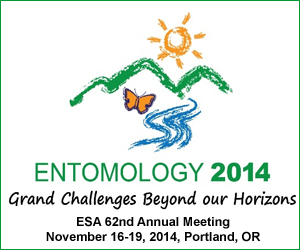Evaluation of Trabulsiella odontotermitis; a termite gut bacterium, as a ‘Trojan horse’ for paratransgenesis based termite control
Evaluation of Trabulsiella odontotermitis; a termite gut bacterium, as a ‘Trojan horse’ for paratransgenesis based termite control
Monday, March 3, 2014: 10:54 AM
Greenbrier (Embassy Suites Greenville Golf & Conference Center)
The presence of gut protozoa is essential for the survival of Formosan subterranean termite, Coptotermes formosanus, since they digest cellulose. Previously, we showed that, the gut protozoa could be killed using a lytic peptide (Hecate) attached to a protozoa specific ligand. Loss of gut protozoa results in starvation and death of termites. Genetically engineered gut bacteria expressing ligand-Hecate could be used as a ‘Trojan horse’ for termite control. In this study Trabulsiella odontotermitis, a termite specific bacterium was assessed as potential ‘Trojan horse’. T. odontotermitis was genetically engineered with a plasmid expressing GFP and was fed to termite workers. The results showed that T. odontotermitis can express foreign proteins in the termite gut, although the plasmid was not maintained longer than two weeks. To study longevity in the gut and transfer to other colony members post consumption, the chromosome of T. odontotermitis was genetically engineered to express a kanamycin resistance gene. The study showed that once ingested, T. odontotermitis maintained expression in the gut for at least 30 days. Genetically engineered T. odontotermitis was also found to be transferred to other colony members. The overall results suggest T. odontotermitis can be utilized as a ‘Trojan horse’ for paratransgenesis.
See more of: Ph.D. Student Oral Presentation Competition I
See more of: Student Ten Minute Paper Competition
See more of: Student Ten Minute Paper Competition


